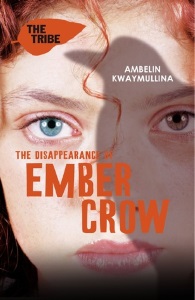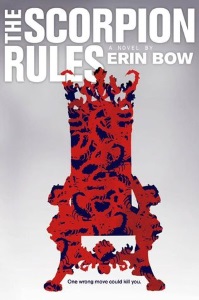Brave new worlds
Along with questions about technological and scientific advances, these recent YA novels — three sci-fi adventures and one science-centric historical fantasy — implicitly explore issues of social justice, inviting readers to think critically about our own world.
 Having escaped from prisonlike Haven in Killer of Enemies, a battle-hardened Lozen now leads her band of refugees through the desert toward safety. However, not only is the desert filled with genetically modified monsters, but the elite Ones who rule Haven have sent a Lakota near-immortal assassin to hunt Lozen down. In Trail of the Dead, the sardonic protagonist is as magnetic, the dangers are as intense, and the invention is as fresh as ever, as Joseph Bruchac develops his dystopian world in new and intriguing directions. Native American legends, including those about irascible trickster Coyote, enrich the tale. (Lee & Low/Tu, 13–16 years)
Having escaped from prisonlike Haven in Killer of Enemies, a battle-hardened Lozen now leads her band of refugees through the desert toward safety. However, not only is the desert filled with genetically modified monsters, but the elite Ones who rule Haven have sent a Lakota near-immortal assassin to hunt Lozen down. In Trail of the Dead, the sardonic protagonist is as magnetic, the dangers are as intense, and the invention is as fresh as ever, as Joseph Bruchac develops his dystopian world in new and intriguing directions. Native American legends, including those about irascible trickster Coyote, enrich the tale. (Lee & Low/Tu, 13–16 years) In The Disappearance of Ember Crow, the action-laden sequel to The Interrogation of Ashala Wolf, Ashala and her Tribe, a group of supernaturally gifted young runaways, leave their protective home to retrieve missing member Ember Crow. Ash's Tribe works to dissolve societal divisions in their post-environmental-cataclysm world; Ember Crow reveals herself to be an entirely new kind of being; and it all blows up in spectacular special-effects fashion. Ambelin Kwaymullina's intriguing novel — described in the author's note as a work of "Indigenous futurism" — brings together the natural world, animal creators, repressive government, and sentient machines, speaking to technological and ecological concerns with a vigorous futuristic imagination. (Candlewick, 13–16 years)
In The Disappearance of Ember Crow, the action-laden sequel to The Interrogation of Ashala Wolf, Ashala and her Tribe, a group of supernaturally gifted young runaways, leave their protective home to retrieve missing member Ember Crow. Ash's Tribe works to dissolve societal divisions in their post-environmental-cataclysm world; Ember Crow reveals herself to be an entirely new kind of being; and it all blows up in spectacular special-effects fashion. Ambelin Kwaymullina's intriguing novel — described in the author's note as a work of "Indigenous futurism" — brings together the natural world, animal creators, repressive government, and sentient machines, speaking to technological and ecological concerns with a vigorous futuristic imagination. (Candlewick, 13–16 years) Four hundred years before Erin Bow's The Scorpion Rules begins, an artificial intelligence ended a series of global wars. Now, under a dubious peace-keeping system, Greta, crown princess of the Pan Polar Confederacy, and other children of royalty are held as hostages to prevent future conflict. The arrival of a new hostage, the insurrectionist Elián, shakes up the formerly stable societal structure. Bow puts a welcome spin on the damsel-in-distress-falls-for-rebellious-boy trope, with Greta's love interest being Da-Xia, Daughter of Heaven, rather than Elián; the cast of the novel is unapologetic in its racial and ethnic diversity; and Greta develops into a protagonist who has a refreshing social awareness. This is a smart, compelling read that explores the complicated natures of love, family, peace, war, and technology. (McElderry, 13–16 years)
Four hundred years before Erin Bow's The Scorpion Rules begins, an artificial intelligence ended a series of global wars. Now, under a dubious peace-keeping system, Greta, crown princess of the Pan Polar Confederacy, and other children of royalty are held as hostages to prevent future conflict. The arrival of a new hostage, the insurrectionist Elián, shakes up the formerly stable societal structure. Bow puts a welcome spin on the damsel-in-distress-falls-for-rebellious-boy trope, with Greta's love interest being Da-Xia, Daughter of Heaven, rather than Elián; the cast of the novel is unapologetic in its racial and ethnic diversity; and Greta develops into a protagonist who has a refreshing social awareness. This is a smart, compelling read that explores the complicated natures of love, family, peace, war, and technology. (McElderry, 13–16 years) In Frances Hardinge's The Lie Tree, fourteen-year-old Faith Sunderly is caught between Victorian society's expectations and her fierce desire to be a scientist ("There was a hunger in her, and girls were not supposed to be hungry"). When her naturalist father is found dead amidst rumors that he faked his fossil discoveries, only Faith knows that it was not suicide, but murder. She gives in to her scientific curiosity, using her father's secret, mysterious "Lie Tree" to self-induce trances she hopes will identify her father's murderer. Hardinge maintains masterful control of the whole complex construct, up to the unmasking of the book's villain — a revelation in itself. (Abrams/Amulet, 13–16 years)
In Frances Hardinge's The Lie Tree, fourteen-year-old Faith Sunderly is caught between Victorian society's expectations and her fierce desire to be a scientist ("There was a hunger in her, and girls were not supposed to be hungry"). When her naturalist father is found dead amidst rumors that he faked his fossil discoveries, only Faith knows that it was not suicide, but murder. She gives in to her scientific curiosity, using her father's secret, mysterious "Lie Tree" to self-induce trances she hopes will identify her father's murderer. Hardinge maintains masterful control of the whole complex construct, up to the unmasking of the book's villain — a revelation in itself. (Abrams/Amulet, 13–16 years)From the April 2016 issue of Notes from the Horn Book.

RECOMMENDED
ALREADY A SUBSCRIBER? LOG IN
We are currently offering this content for free. Sign up now to activate your personal profile, where you can save articles for future viewing.






Add Comment :-
Comment Policy:
Comment should not be empty !!!
Chandra Lawrie
My kids like the whole "Mad Max" type appeal, they would like Trail of the Dead. In fact they would like all of these. They are reading Snowflake River by Ben Eliahu, snowflakeriver.com is his site. They are into good fantasy reads and this one is great, I will be reading it next!Posted : Apr 13, 2016 05:54